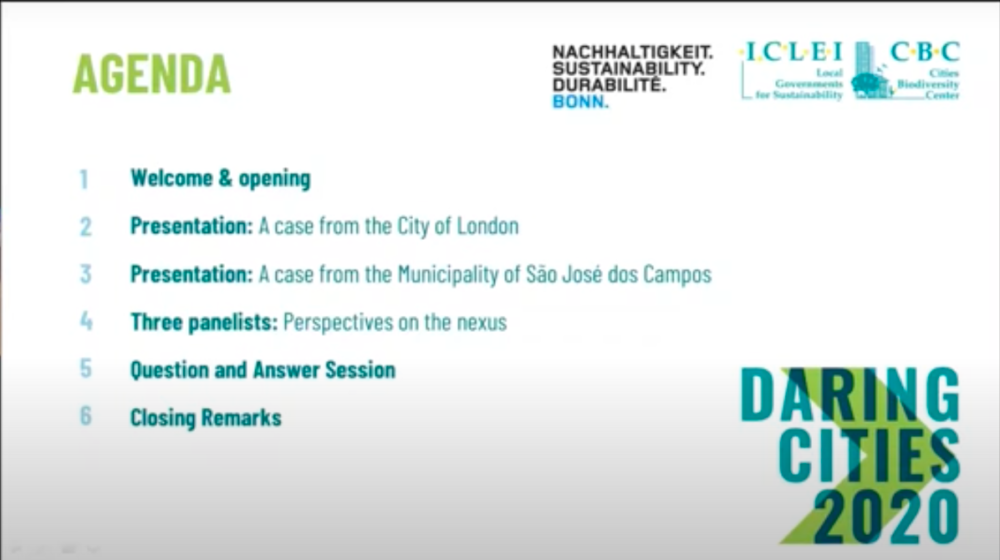
In order to access the video, you must create an account on Daringcities.org or log-in.
The contributions and co-benefits of nature and nature-based solutions (NbS) in urban contexts are well-recognized. For example, urban green corridors and green spaces not only create habitat for wildlife, but also cool the city, sequester carbon and filter air pollutants. At the same time, the amenity value of these areas support the physical and psychological well-being of urban residents as they seek nature to rejuvenate body and soul.
There appears to be a natural and synergistic intersection or ‘nexus’ between (1) urban nature, (2) climate mitigation and adaptation and (3) the health of urban communities. Why is it then that we don’t observe more frequent and large-scale investment in urban nature? Despite wide acknowledgement of the multiple and intersecting benefits of nature to urban societies, the operationalization of these co-benefits and the body of evidence to support the value of urban nature, is lagging behind.
This is reflected in the relatively slow uptake of nature-based solutions into urban agendas, as is the actual investment in urban nature. The challenges are multi-faceted: Urban nature and nature-based solutions need to be applied at the appropriate scale and patterning to have measurable response to climate impact and adoption of nature-based solutions will require fundamental departures from traditional decision-making. In addition, the consideration of nature-based solutions for climate adaptation can contain complex trade-offs and limitations, for example it is possible that in some instances, climate mitigation policy encourages NbS with low biodiversity value.
Given the challenges and limitations to adopting NbS and investing in urban nature, we are interested in the following question: Can a nexus approach, based on nature’s co-benefits, generate new insights to leverage greater interest and investor confidence in urban nature?
This session explores the potential that a nexus approach – in this case: nature – climate – health – might have in terms of creating new insights, pathways and processes to bolster nature’s support to climate mitigation and adaptation and human health and well-being in cities.
Viewers will come away with new insights about how a nexus approach can be used as a conceptual/thinking tool to generate new insights that cannot be derived by separate discussions on nature, climate and health. These insights should lead to novel ways of designing nature-based interventions, collaborating and investing in nature to operationalize the multiple benefits of nature to climate and health. Finally, these insights, and exchanges on best practices, could help shape policy making in the urban context.
Moderator
- Dr. Timon McPhearson is Associate Professor of Urban Ecology, Director of the Urban Systems Lab. New York city, USA.
Speakers
- Mr Peter Massini, Lead: Green Infrastructure, Greater London Authority, London, United Kingdom
- Ms. Livia Correa Silva, Technical Analyst at the Municipality of São José dos Campos, Brazil
- Professor Harriet Bulkeley, Department of Geography, Durham University. Co-ordinator of NATURVATION, Stockton Road, Durham, United
Kingdom - Mr David Maddox, Executive Director: The Nature of Cities, New York City, USA
